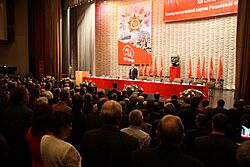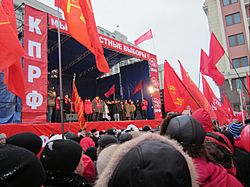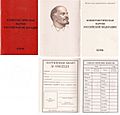Communist Party of the Russian Federation facts for kids
Quick facts for kids
Communist Party of the Russian Federation
Коммунистическая Партия Российской Федерации
|
|
|---|---|
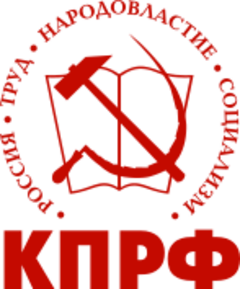 |
|
| Abbreviation | CPRF (English) КПРФ (Russian) KPRF (Romanized) |
| General Secretary | Gennady Zyuganov |
| First Deputy Chairmen | Ivan Melnikov Yury Afonin |
| Deputy Chairmen | Vladimir Kashin Dmitry Novikov Leonid Kalashnikov |
| Parliamentary Leader | Gennady Zyuganov |
| Founded | 14 February 1993 |
| Preceded by | CP RSFSR |
| Headquarters | 16th building, Ol'khovskaya Ulitsa Moscow, Russia 105066 |
| Newspaper | Pravda (81 regional editions) |
| Youth wing | Komsomol |
| Membership (2024 est.) | |
| Ideology |
|
| Political position | Far-left |
| National affiliation | National Patriotic Forces of Russia |
| Continental affiliation | UCP–CPSU |
| International affiliation | IMCWP |
| Colours | Red |
| Slogan |
|
| Anthem |
("The Internationale") |
| Seats in the State Duma |
57 / 450
|
| Seats in the Federation Council |
4 / 178
|
| Governors |
3 / 85
|
| Seats in the Regional Parliaments |
449 / 3,928
|
| Ministers |
0 / 31
|
| Party flag | |
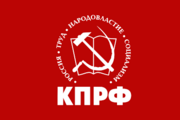 |
|
| Website | |
| (Russian) (English) |
|
The Communist Party of the Russian Federation (CPRF) is a major political party in Russia. It follows a communist way of thinking, based on Marxism–Leninism. The CPRF is the second-largest political party in Russia, after United Russia. Its youth group is called the Leninist Young Communist League.
The CPRF's roots go back to the Russian Social Democratic Labour Party, formed in 1898. This party later split into two groups. One of these, the Bolsheviks, led by Vladimir Lenin, is the direct ancestor of the Communist Party of the Soviet Union (CPSU). The Bolsheviks took power in Russia during the October Revolution of 1917. After the CPSU was banned in 1991, the CPRF was created on February 14, 1993. It took over from the previous communist party in Russia. For a short time, from 1998 to 1999, the CPRF was the main party in the State Duma, which is a part of Russia's parliament.
The party wants to create a new, modern form of socialism in Russia. They aim to do this peacefully. Some of their main goals include the government taking control of natural resources, farms, and big industries. They believe this should happen within a mixed economy, where small and medium businesses can still grow.
Contents
History of the CPRF
The CPRF was officially founded on February 14, 1993. It declared itself the successor to the Communist Party of the Russian Soviet Federative Socialist Republic. The party quickly became very large, with about 500,000 members soon after it started. This was more than double the number of members in all other parties combined.
Gennady Zyuganov helped start the party and was chosen as its leader. He had been a strong critic of some changes happening in the Soviet Union before it ended. After the Soviet Union broke apart in 1991, Zyuganov became active in a movement that focused on Russian national pride.
After doing well in the 1995 election, the CPRF became the main opposition to then-President Boris Yeltsin in the 1996 presidential election. Zyuganov brought together different groups to support him. Even though Yeltsin won, Zyuganov's group continued to work together.
The party saw a big drop in seats in the 2003 election. Zyuganov said the elections were unfair. In 2014, the party asked Russia to officially recognize two regions, Donetsk and Luhansk, which later happened in 2022.
In 2021, the party's offices were searched by Russian authorities. This happened after the party disagreed with the results of an online election and tried to challenge them in court.
After the conflict in Ukraine began in 2022, the CPRF supported Russia's actions. They said that other countries were threatening Russia's security. The party described the conflict as a fight against certain groups in Ukraine. However, two members of the CPRF in parliament did express some opposition to the war, though they supported protecting people in the Donbass region. Because of the party's support for the conflict, many of its lawmakers, including Zyuganov, faced actions from countries like the United States and the United Kingdom.
In 2022, Zyuganov suggested that the CPRF could join with another left-leaning party, but only if the new party followed the communist program.
What the CPRF Believes In
The CPRF wants to change Russia into a socialist country peacefully. They look at China's economic system as a good example for Russia. The party supports the government owning major industries. They also want to take back businesses that were sold off after the Soviet Union ended. The CPRF believes in providing help to state-owned companies and keeping strong welfare programs for citizens.
The party's main goals were updated in 2008. The CPRF stated that it is the only political group that truly stands up for workers' rights and Russia's national interests. Their long-term goal is to build a "renewed socialism" in Russia. The party says it follows Marxism–Leninism, which is a set of ideas about how society should be organized.
The CPRF plans to reform Russia in three steps. First, they want workers to have more power through a government led by the CPRF. This would help fix problems from past reforms, like taking back privatized property. However, small businesses would still exist and be protected. Second, the role of local councils and trade unions would grow. The economy would slowly move towards a socialist system, but some private businesses would remain. Finally, the third step is to fully build socialism.
Gennady Zyuganov has said that Russia should learn from China's success in building its own kind of socialism. He even told party members to read books by Deng Xiaoping, a former leader of China.
Party Goals and Ideas
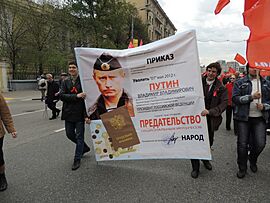
The CPRF has several key proposals for Russia today:
- Stop the population decline and help large families.
- Bring back public kindergartens and provide homes for young families.
- Have the government take control of Russia's natural resources and important industries.
- Use the money from these industries to benefit all citizens.
- Bring Russia's financial savings back from foreign banks to help the country's economy.
- Make elections fair and stop fraud.
- Create a truly independent court system.
- Take steps to fight poverty and control prices of basic goods.
- Do not raise the retirement age.
- Make the government responsible for housing and utilities again.
- Limit housing costs to no more than 10% of a family's income.
- Increase funding for science and give scientists good pay.
- Bring back the high standards of free education from the Soviet era.
- Make sure healthcare is available and good quality.
- Develop advanced manufacturing industries.
- Ensure the country has enough food and a clean environment.
- Support large collective farms.
- Prioritize paying off debts within Russia before foreign debts.
- Introduce a tax system where lower-income citizens pay less or no taxes.
- Help small and medium businesses grow.
- Make sure culture is accessible to everyone and protect Russian culture.
- Stop negative talk about Russian and Soviet history.
- Take strong actions against corruption and crime.
- Make national defense stronger and support military and law enforcement.
- Protect Russia's borders and help Russians living abroad.
- Work with other countries to help bring back a union of states.
The party also supports working with the Russian Orthodox Church. Zyuganov has said the CPRF believes in science, but is not against religion. However, promoting any specific religion is not allowed within the party. The CPRF often celebrates the time when Joseph Stalin was in charge. During the conflict in Ukraine, the party supported the military actions.
How the Party is Organized
The CPRF is officially registered in Russia. Its structure is similar to the old Communist Party of the Soviet Union. It is led by a Central Committee. The party has offices in 81 regions of Russia. Each regional office is run by a local committee. The main headquarters of the party is in Moscow. The Leninist Komsomol of the Russian Federation is the party's youth group.
Working with Other Countries
In 1993, the CPRF helped create the Union of Communist Parties – Communist Party of the Soviet Union. Since 2001, Gennady Zyuganov has led this group.
The party has good relationships with the Party of the European Left, but it is not a member. It also has friendly ties with the Chinese Communist Party.
In 2017, the party sent a group to North Korea and signed an agreement to work together with the Workers' Party of Korea. In October 2017, the CPRF hosted a big meeting of communist parties from around the world in Saint Petersburg. This meeting marked 100 years since the October Revolution.
Party Media
The official newspaper of the Communist Party is Pravda. It has 81 different versions for different regions.
Another newspaper, Sovetskaya Rossiya, which focuses on Russian national pride, also has friendly ties with the Communist Party.
Party Support and Election Results
The CPRF is popular in big cities, industrial areas, and scientific centers. It also has strong support in smaller towns around Moscow. The party is also strong in the Russian Far East, Siberia, and the Ural Mountains. Many people who support the CPRF are those who faced economic difficulties after the Soviet Union ended. The party is thought to be popular among older people who feel a sense of nostalgia for the Soviet Union.
Presidential Elections
In all Russian presidential elections, the CPRF's candidate has finished in second place. Some politicians have suggested that the CPRF candidate, Zyuganov, might have actually won the 1996 election if there hadn't been issues with the voting.
| Election | Candidate | First round | Second round | Result | ||
|---|---|---|---|---|---|---|
| Votes | % | Votes | % | |||
| 1996 | Gennady Zyuganov | 24,211,686 | 32.03 | 30,102,288 | 40.31 | Lost |
| 2000 | 21,928,468 | 29.21 | Lost | |||
| 2004 | Nikolay Kharitonov | 9,513,313 | 13.69 | Lost | ||
| 2008 | Gennady Zyuganov | 13,243,550 | 17.72 | Lost | ||
| 2012 | 12,318,353 | 17.18 | Lost | |||
| 2018 | Pavel Grudinin | 8,659,206 | 11.77 | Lost | ||
| 2024 | Nikolay Kharitonov | 3,768,470 | 4.37 | Lost | ||
Parliamentary Elections
| Election | Leader | Votes | % | Seats | +/– | Rank | Government |
|---|---|---|---|---|---|---|---|
| 1993 | Gennady Zyuganov | 6,666,402 | 12.40 |
42 / 450
|
3rd | Opposition | |
| 1995 | 15,432,963 | 22.30 |
157 / 450
|
Opposition (1995–1998) | |||
| Coalition (1998–1999) | |||||||
| Opposition (1999) | |||||||
| 1999 | 16,196,024 | 24.29 |
113 / 450
|
Opposition | |||
| 2003 | 7,647,820 | 12.61 |
51 / 450
|
Opposition | |||
| 2007 | 8,046,886 | 11.57 |
57 / 450
|
Opposition | |||
| 2011 | 12,599,507 | 19.19 |
92 / 450
|
Opposition | |||
| 2016 | 7,019,752 | 13.34 |
42 / 450
|
Opposition | |||
| 2021 | 10,660,599 | 18.93 |
57 / 450
|
Opposition |
Regional Elections
The CPRF has also had success in elections for regional governments. In 2005, they won against the ruling party in the Nenets Autonomous Okrug. They also did well in the Moscow Duma election in 2005, getting their best result ever in Moscow.
In 2007, the CPRF performed very well in 14 regional elections, increasing their votes in most areas. They came in second place in many regions. This showed that the CPRF was a very important opposition party in Russia.
In 2007, a Communist candidate, Roman Grebennikov, won the mayoral election in Volgograd. He became the youngest mayor of a regional capital. However, he later switched his support to another party, which upset many Communists. In 2011, another CPRF candidate, Ilya Potapov, won the mayoral election in Berdsk.
In 2015, a CPRF candidate, Sergey Levchenko, won the election for governor in Irkutsk Oblast. In 2018, two more CPRF candidates, Andrey Klychkov and Valentin Konovalov, won gubernatorial elections in Oryol Oblast and Khakassia. In the 2018 regional parliament elections, the Communist Party came in first place in three regions. In Irkutsk Oblast, they became the largest group in the Legislative Assembly.
Images for kids
-
Demonstration of communists on the Red Square
-
Communists marching on International Workers' Day in 2009, Severodvinsk
-
Party members lay down flowers at the tomb of Joseph Stalin
See also
 In Spanish: Partido Comunista de la Federación de Rusia para niños
In Spanish: Partido Comunista de la Federación de Rusia para niños
- CPRF faction in the State Duma
- History of the Communist Party of the Soviet Union
- List of communist parties
- Politics of Russia
 | Georgia Louise Harris Brown |
 | Julian Abele |
 | Norma Merrick Sklarek |
 | William Sidney Pittman |


